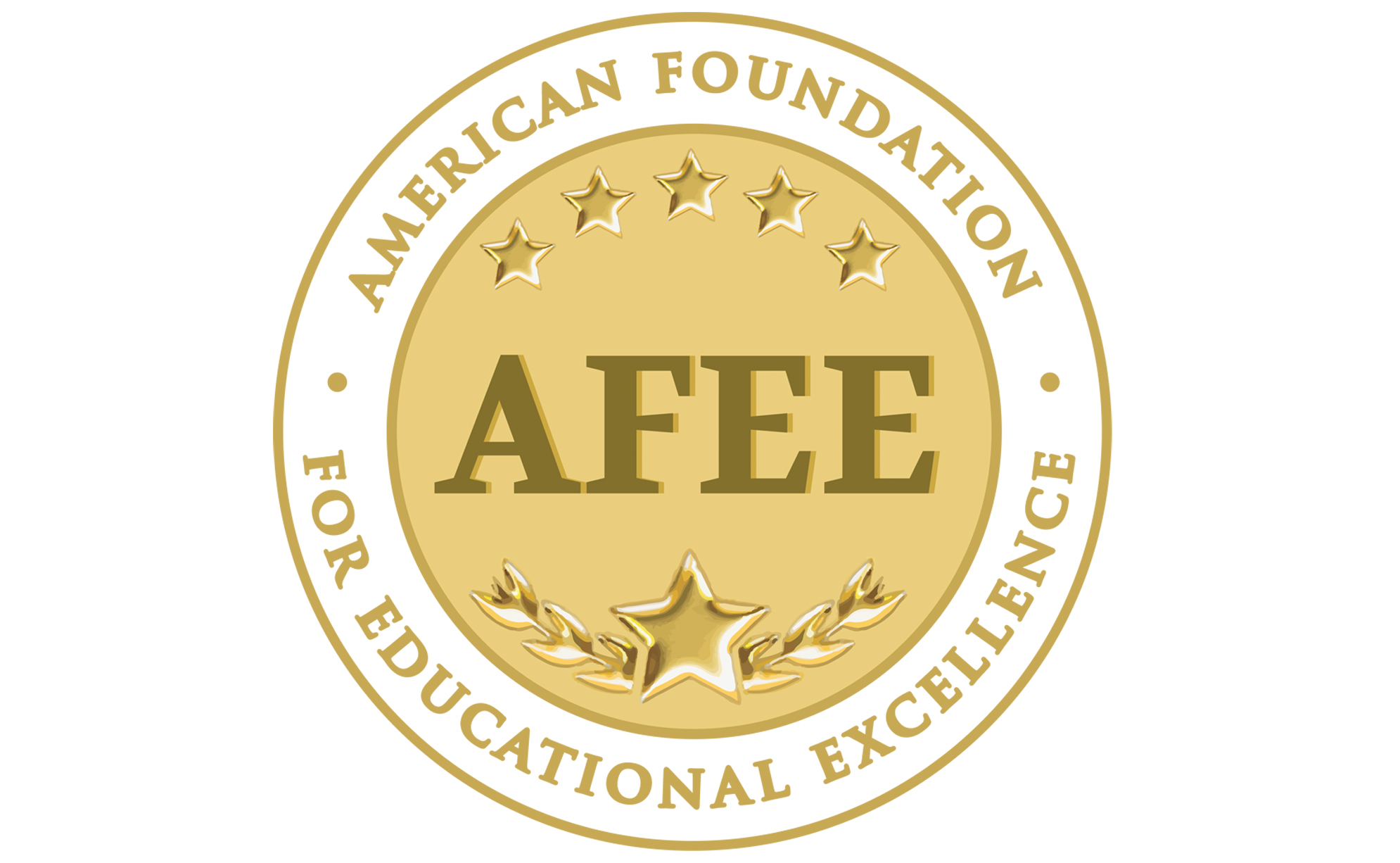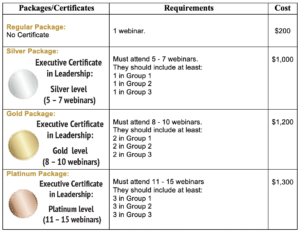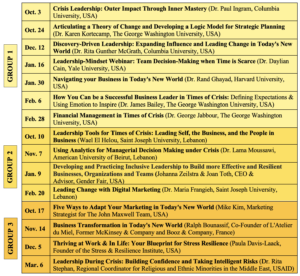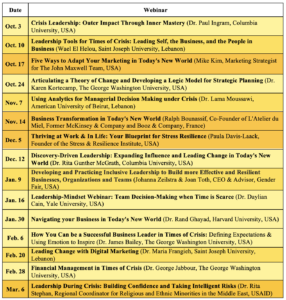Unique Program for an
Executive Certificate in Leadership:
“Re-Engineering the Future of Business:
How to Survive & Thrive in Today’s New World.”
On Saturdays from 10:00 AM to 12:00 PM New York Time
Ends on Mar. 6, 2021
WEBINAR SERIES: DETAILS
- Webinar Packages, Certificates, Requirements, and Cost
- Webinar Groups
- Webinar Details (Including Presenters)
1. WEBINAR PACKAGES, CERTIFICATES, REQUIREMENTS, AND COST:
Each webinar costs $200, and registration is on a rolling basis.
Packages are available with a 25% to 55% discount, depending on the package you choose.
If you are interested in becoming a member of AFEE’s closed “International Community of Leaders Club” and in receiving a digital Executive Certificate in Leadership, you must attend at least 5 webinars.
[Certificates will be presented by the AFEE, IFWE, and USJ-CFP and will reflect the number of webinars attended along with webinar details.]
CLICK HERE TO REGISTER
2. WEBINAR GROUPS:
Same Day/Time for All: Saturdays from 10 AM-12 PM New York Time [Except number 15 > moved to Sunday, Feb. 28]
CLICK HERE TO REGISTER
3. WEBINAR DETAILS:
Introduction (Nada M. Salem, AFEE/IFWE’s President/CEO, 15 minutes at the beginning of each webinar)
Please note that “Navigating your Business in Today’s New World (Dr. Rand Ghayad, Harvard University)” was MOVED to January 30, 2021.
1- Oct. 3, 2020:
Crisis Leadership: Outer Impact Through Inner Mastery– Developing impactful strategies and helping others do better, from a foundation of self-leadership (Dr. Paul Ingram, Columbia University, USA, 2 hrs.)
 This two-hour webinar will present a practical, interactive guide to effective leadership during crises. It will consist of three domains:
This two-hour webinar will present a practical, interactive guide to effective leadership during crises. It will consist of three domains:
A- Personal Leadership: The Role of Values
Leadership is a social act, but effective leadership begins with leading ones’ self. We will offer guidance and a practical tool for personal leadership in crises through the lens of values. We will begin with a discussion of how leaders rely on their values during crises, including examples. We will then conduct a hands-on exercise helping the participants identify their most salient values, so they can rely on them during crises for motivation, decision making, stress management and trust building.
B- Interpersonal Leadership: Inspiration and Inclusion
Responding to crises takes a team. Effective leaders bring out the best in the people they lead during a crisis. We will again begin with examples and go on to identify best practices for inspiring a team to operate effectively during crises and making the most of their efforts and perspectives to solve novel problems. A key concept will be what the leader can do to produce psychological safety during the crisis.
C- Strategic Leadership: Prioritization and Planning
We’ll discuss the role of strategy during a crisis and how to lead strategically with a clear, concise communication of priorities to the organization. We will also introduce and engage the concept of scenario planning as a way to prepare strategically in the face of uncertainty. Participants will put this tool to work to think of uncertainty in their own domain.
LEARNING OUTCOMES:
Participants will gain the following:
-
-
-
- A concise expression of their top values that can be called on during a crisis to:
-
-
-
-
-
-
- Make decisions;
- Motivate;
- Resist stress;
- Build trust-based connections with others;
- Act ethically.
-
-
-
-
-
-
- Best practices for inspiring and including others during a crisis including:
-
-
-
-
-
-
- Tools for producing psychological safety;
- What to communicate and when.
-
-
-
-
-
-
- Guidance on leading strategically during a crisis:
-
-
-
-
-
-
- Examples and practice of the role of strategic priorities in a crisis;
- A tool for preparing strategically for uncertain futures.
-
-
-
2- Oct. 10, 2020:
Leadership Tools for Times of Crisis: Leading Self, the Business, and the People in Business (Wael El Helou, Saint Joseph University, Lebanon, 2 hrs.)
 In a world where extreme change has overnight become the new normal, past experience, old values and acquired habits seem to work no more. The list of variables under constant pressure is so long; it is making everyone’s Maslow’s pyramid (Hierarchy of Needs) go nuts over what to service first and what priorities look like today. Leaders have found themselves overnight playing a new game with new rules that almost no one is familiar with.
In a world where extreme change has overnight become the new normal, past experience, old values and acquired habits seem to work no more. The list of variables under constant pressure is so long; it is making everyone’s Maslow’s pyramid (Hierarchy of Needs) go nuts over what to service first and what priorities look like today. Leaders have found themselves overnight playing a new game with new rules that almost no one is familiar with.
LEARNING OUTCOMES:
Participants will explore ways to align the 3 pillars of the continuum of leadership:
-
-
-
- How to balance values and priorities, and therefore actions that seem contradictory or pulling in opposite directions, and yet, when looked at closely, are complimentary for our internal balance and sanity;
- How to apply a tool inspired by Buddhists in the Tibet called the Wheel of Life.
-
-
-
-
-
- How to, simultaneously, survive and build fitness, resilience and stamina during this crisis (act for short term readiness), and reinvent the business in such a way for it to fit the world of tomorrow that is under construction with a debatable shape, depending on the time the market will take to normalize (act for long, and maybe medium term readiness);
- How to apply a creative problem-solving process inspired by the work of IDEO and strategy consultants;
- How to use a feedback format that builds creative momentum.
-
-
-
-
-
- How to equip people with the right mindset;
- How to create agility in teams;
- How to become aware of the Relationship Systems Intelligence (RSI) and its impact on fitness, resilience, and engagement, and what to do about it.
-
-
3- Oct. 17, 2020:
Five Ways to Adapt Your Marketing in Today’s New World (Mike Kim, Marketing Strategist for The John Maxwell Team, USA, 2 hrs.)
-
-
-
- Participants will learn how to double or even triple their leads and sales while cutting their marketing budget in half, all while leveraging social media and online marketing;
- Participants will learn how to get ahead of competitors, capitalize on customers ready to purchase now, and set themselves up for success in today’s new world.
-
-
4- Oct. 24, 2020:
Articulating a Theory of Change and Developing a Logic Model for Strategic Planning: Think Through, Better Understand and Evaluate Your Business to Achieve Your Goals (Dr. Karen Kortecamp, George Washington University, USA, 2 hrs.)
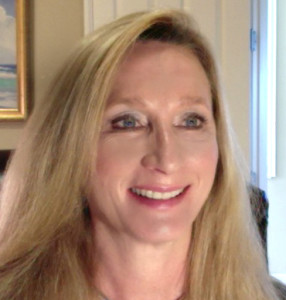 Theory of change is a methodology for planning, participation, and evaluation that is used in companies, government sectors, education programs, and nonprofits to promote change. A defined theory of change will allow leaders to make more informed decisions about strategy and tactics.
Theory of change is a methodology for planning, participation, and evaluation that is used in companies, government sectors, education programs, and nonprofits to promote change. A defined theory of change will allow leaders to make more informed decisions about strategy and tactics.
LEARNING OUTCOMES:
-
-
-
- Participants will learn how to map their organizations’ Theory of Change to achieve short, medium, and long-term goals using a Logic Model.
-
-
5- Nov. 7, 2020:
Using Analytics for Managerial Decision Making under Crisis (Dr. Lama Moussawi, American University of Beirut, Lebanon, 2 hrs.)
This webinar will cover the principles and techniques of applied mathematical modeling for managerial decision-making in general, with a particular focus on risk and uncertainty. Business models will be drawn from diverse functional areas including finance, marketing and operations.
LEARNING OUTCOMES:
-
-
- Participants will learn how to make good business decisions;
- Participants will learn how to deal with uncertainty;
- Participants will acquire critical thinking skills in business decision making;
- Participants will learn apply modeling techniques to business problems.
-
6- Nov. 14, 2020:
Business Transformation in Today’s New World (Ralph Bounassif, Co-Founder of L’Atelier du Miel, Former McKinsey & Company and Booz & Company, Paris, France, 2 hrs.)
The explosion of complexity, uncertainty, and frequency of change is disrupting businesses globally. The need to transform has become an essential part of business for most organizations. But the fact is that business transformation is one of the most difficult tasks to undertake. 75% of business transformations globally fail (Source: McKinsey & Co.). While there is no exact recipe for success, there are practices that can help significantly improve the chances of leading a successful transformation.
In this webinar, we will cover the main steps and guiding principles to follow in designing and executing a successful business transformation.
LEARNING OUTCOMES:
-
-
- Participants will develop an understanding of how to build a robust business transformation plan that has significantly higher chances to succeed.
-
7- Nov. 28, 2020: MOVED to Jan. 30, 2021
Navigating your Business in Today’s New World (Dr. Rand Ghayad, Harvard University, USA, 2 hrs.)
 The unprecedented impacts of Covid-19 on global and national health systems, economies, trade, cultures, and societies have attracted significant interest globally. The public and private sectors are struggling to respond to the pandemic.
The unprecedented impacts of Covid-19 on global and national health systems, economies, trade, cultures, and societies have attracted significant interest globally. The public and private sectors are struggling to respond to the pandemic.
LEARNING OUTCOMES:
Participants will learn about:
-
-
-
- Challenges facing governments and business leaders;
- Impact on labor and employment markets;
- Post-lockdown economy and economic responses;
- Going forward – Preparing for the next pandemic.
-
-
8- Dec. 5, 2020:
Thriving at Work & In Life: Your Blueprint for Stress Resilience (Paula Davis-Laack, JD, Founder of the Stress & Resilience Institute, USA, 2 hrs.)
 We are living, working and parenting in stressful times. Skills, like resilience, help you better manage all of the challenges and setbacks you regularly face.
We are living, working and parenting in stressful times. Skills, like resilience, help you better manage all of the challenges and setbacks you regularly face.
LEARNING OUTCOMES:
-
-
-
- Participants will learn about what resilience is, important resilience myths and key resilience building blocks;
- Participants will leave with specific skills they can begin to use immediately, both at home and at work.
-
-
9- Dec. 12, 2020:
Discovery-Driven Leadership: Expanding Influence and Leading Change in Today’s New World (Dr. Rita Gunther McGrath, Columbia University, USA, 2hrs.)
 This webinar will tackle how a leader can create a context in which innovative problem solving can take place; it will also offer some guidance as to how leaders can strengthen their leadership muscles to truly get the best out of what their teams can do.
This webinar will tackle how a leader can create a context in which innovative problem solving can take place; it will also offer some guidance as to how leaders can strengthen their leadership muscles to truly get the best out of what their teams can do.
LEARNING OUTCOMES:
Participants will learn about three elements that are key:
-
-
-
- Collaboration that facilitates “creative abrasion” between diversely talented people;
- Discovery-driven learning that facilitates creative agility;
- Integrative decision-making that represents creative resolution.
-
-
10- Jan. 9, 2021:
Developing and Practicing Inclusive Leadership to Build more Effective and Resilient Businesses, Organizations and Teams (Johanna Zeilstra & Joan Toth, CEO & Advisor at Gender Fair, USA, 2 hrs.)
During this interactive webinar, participants will learn strategies and practical skills that will help them become more inclusive leaders and unlock inclusion in their teams. Johanna & Joan will cover the following:
- The “What & Why” of unconscious bias and its impact on the work environment;
- Modeling inclusive behavior examples and case studies;
- Solutions designed for action and behavior change;
- Leveraging bias “interrupters;”
- Being an “upstander,” not a “bystander.”
11- Jan. 16, 2021:
Leadership-Mindset Webinar: Team Decision-Making when Time is Scarce (Dr. Daylian Cain, Yale University, USA, 2 hrs.)
 Award-winning Yale faculty member studies why smart people do dumb things.
Award-winning Yale faculty member studies why smart people do dumb things.
LEARNING OUTCOMES:
-
-
-
- Participants will learn the behavioral-economic theory behind making better decisions through RED-TEAMING.
- Participants will learn practical leadership tips on how to apply RED-TEAMING.
- Participants will learn how to support healthy disagreement in their teams without wasting time and without lacking confidence.
-
-
12- Jan. 23, 2021: MOVED to Mar. 6, 2021
Leadership During Crisis: Building Confidence & Taking Intelligent Risks (Dr. Rita Stephan, Research Fellow at North Carolina State University (NCSU); Regional Coordinator for Religious and Ethnic Minorities in the Middle East, USAID; Formerly: Director of the Middle East Partnership Initiative/MEPI, US Government, 2 hrs.)
 This webinar focuses on elements that are essential to leading a team to success, especially during challenging times. Intellectual risk taking is a new approach that is introduced in the educational system but is slow to be adopted in the workforce. Conforming rather than risk-taking has historically been rewarded, but the new work environments are starting to reward those who stand out.
This webinar focuses on elements that are essential to leading a team to success, especially during challenging times. Intellectual risk taking is a new approach that is introduced in the educational system but is slow to be adopted in the workforce. Conforming rather than risk-taking has historically been rewarded, but the new work environments are starting to reward those who stand out.
LEARNING OUTCOMES:
-
-
-
- Participants will learn how to encourage, adopt and reward intellectual risk taking;
- Participants will learn how to improve communication to reduce conflict, promote understanding over judging, increase self and social awareness, and provide tools for managing relationships and responsibilities during crisis, all while encouraging trust and loyalty (Adaptive Leadership);
- Participants will learn about leadership during Corona Virus;
- Participants will learn about communication to change.
-
-
[7- Jan. 30, 2021: MOVED FROM Nov. 28, 2020]
Navigating your Business in Today’s New World (Dr. Rand Ghayad, Harvard University, USA, 2 hrs.)

The unprecedented impacts of Covid-19 on global and national health systems, economies, trade, cultures, and societies have attracted significant interest globally. The public and private sectors are struggling to respond to the pandemic.
LEARNING OUTCOMES:
Participants will learn about:
- Challenges facing governments and business leaders;
- Impact on labor and employment markets;
- Post-lockdown economy and economic responses;
- Going forward – Preparing for the next pandemic.
13- Feb. 6, 2021:
How You Can Be a Successful Business Leader in Times of Crisis: Defining Expectations & Using Emotion to Inspire (Dr. James Bailey, Professor of Leadership Development at The George Washington University, USA, 2 hrs.)
 The purpose of this webinar is to show how leadership is mainly an emotional relationship. The fact that leadership is about emotion is supported by two decades of brain research. Humans respond to the environment emotionally first. This is especially so in crisis.
The purpose of this webinar is to show how leadership is mainly an emotional relationship. The fact that leadership is about emotion is supported by two decades of brain research. Humans respond to the environment emotionally first. This is especially so in crisis.
LEARNING OUTCOMES:
-
-
-
- Participants will learn how to manage their own and others’ emotions through the concept of emotional intelligence. People choose their leaders because of how those leaders make them feel. During crisis, the emotional state leaders bring about makes the difference between succeeding and floundering.
-
-
14- Feb. 20, 2021:
Leading Change with Digital Marketing (Dr. Maria Frangieh, Saint Joseph University, Lebanon, 2 hrs.)
-
-
-
- Participants will enhance their understanding of new technologies that are impacting the way businesses, employees and customers are behaving today;
- Participants will elevate their skills in change leadership by embracing the digital transformation in marketing strategies;
- Participants will set up digital marketing plans for individuals and businesses.
-
-
15- Feb. 27, 2021: MOVED to Feb. 28, 2021
Financial Management in Times of Crisis (Dr. George Jabbour, Associate Dean for Executive Education and Professor of Finance at The George Washington University, USA, 2 hrs.)
Participants will learn about the following in order to survive:
- Basics of Financial Management
- Reaction to a Crisis
- How to Survive a Crisis
- Financial Management Tips
- Recipe for Success
[12- Mar. 6, 2021: MOVED FROM Jan. 23, 2021]
Leadership During Crisis: Building Confidence & Taking Intelligent Risks (Dr. Rita Stephan, Research Fellow at North Carolina State University (NCSU); Regional Coordinator for Religious and Ethnic Minorities in the Middle East, USAID; Formerly: Director of the Middle East Partnership Initiative/MEPI, US Government, 2 hrs.)
 This webinar focuses on elements that are essential to leading a team to success, especially during challenging times. Intellectual risk taking is a new approach that is introduced in the educational system but is slow to be adopted in the workforce. Conforming rather than risk-taking has historically been rewarded, but the new work environments are starting to reward those who stand out.
This webinar focuses on elements that are essential to leading a team to success, especially during challenging times. Intellectual risk taking is a new approach that is introduced in the educational system but is slow to be adopted in the workforce. Conforming rather than risk-taking has historically been rewarded, but the new work environments are starting to reward those who stand out.
LEARNING OUTCOMES:
-
-
-
- Participants will learn how to encourage, adopt and reward intellectual risk taking;
- Participants will learn how to improve communication to reduce conflict, promote understanding over judging, increase self and social awareness, and provide tools for managing relationships and responsibilities during crisis, all while encouraging trust and loyalty (Adaptive Leadership);
- Participants will learn about leadership during Corona Virus;
- Participants will learn about communication to change.
-
-
CLICK HERE TO REGISTER
TERMS OF SERVICE: We reserve the right, in our sole discretion, to reject or remove anyone who has registered or gained access under false pretenses, provided false information, or for any other action or behavior that we deem inappropriate, before, during or after the webinars, with or without prior notice or explanation, and without liability.
IMPORTANT DISCLAIMER: All rights reserved. The information on this page shall be considered proprietary information not to be used, copied or reproduced in any way. No part of our presentations/workshops/webinars may be reproduced, distributed, or transmitted in any form or by any means, including photocopying, recording, or other electronic or mechanical methods.
WEBINARS WITH THE
INTERNATIONAL FOUNDATION FOR WOMEN’S EMPOWERMENT
